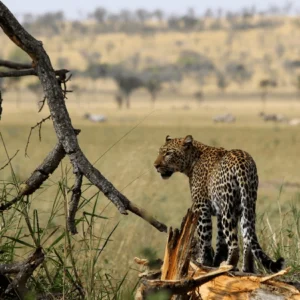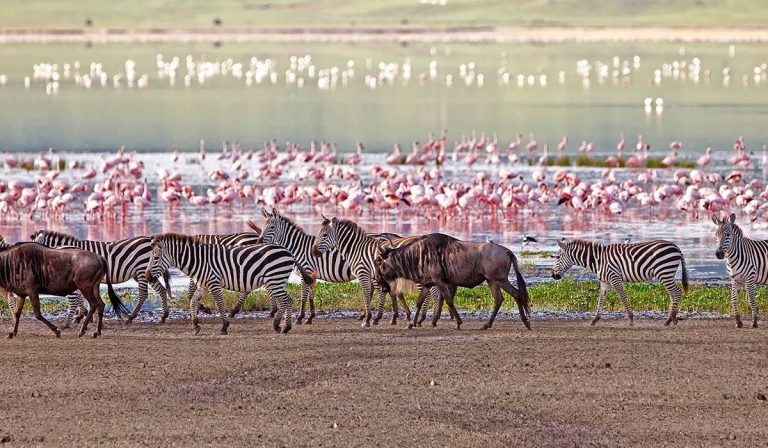An African safari is a dream come true for many, an immersive journey into the heart of the wild where nature reigns supreme. To ensure this unparalleled experience remains safe, respectful, and truly unforgettable for both you and the wildlife, there are crucial etiquette guidelines to follow. Knowing what not to do is as important as knowing what to do. Adhering to these unspoken rules ensures not only your safety but also the preservation of the delicate ecosystems you’ve come so far to witness. When on an African safari, you shouldn’t engage in behaviors that could startle animals, disrupt their natural behavior, or put yourself or others at risk. This includes not using flash photography, avoiding loud noises or calling out to animals, and not leaving your vehicle unless explicitly permitted by your guide.
1. Don’t Approach Wild Animals: Respecting Their Space
This is the golden rule of safari: do not approach wild animals. Your safari vehicle, guided by an experienced professional, provides a safe observation platform. Animals, even seemingly docile ones, are unpredictable. Approaching them on foot, making sudden movements, or attempting to draw their attention can be perceived as a threat, potentially leading to dangerous or aggressive reactions. Respecting their personal space is paramount for your safety and their well-being. Your guide will always position the vehicle at a safe and appropriate distance.
2. Avoid Excessive Noise: The Sound of Silence
The magic of the bush often lies in its subtle sounds – the rustle of leaves, the distant call of a bird, the crunch of dry grass underfoot. Avoid excessive noise while on safari. Loud talking, shouting, or playing music can disturb wildlife, scaring them away or disrupting their natural behaviors like hunting or feeding. It also detracts from the experience for your fellow travelers. Keep conversations to a low volume, and allow the sounds of the wilderness to fill the air.
3. Don’t Litter: Preserve Pristine Wilderness
Africa’s national parks and reserves are pristine wilderness areas, home to incredible biodiversity. Do not litter, under any circumstances. Even small items like tissues, plastic bottles, or food wrappers can have devastating effects on wildlife and pollute the environment. Always carry a reusable water bottle and dispose of all waste responsibly in designated bins back at your camp or lodge. “Leave no trace” should be your mantra.
4. Refrain from Feeding Animals: Maintaining Wild Behavior
It might seem harmless, or even a kind gesture, but refrain from feeding animals. This is incredibly detrimental to wildlife. It makes animals reliant on human handouts, can lead to aggressive behavior (as they associate humans with food), disrupts their natural foraging habits, and can introduce diseases or inappropriate nutrition. Animals found around human settlements due to feeding often become habituated, leading to conflicts and sometimes even their unfortunate culling. Keep all food items secured within your vehicle or tent.
5. Avoid Bright Colors: Blending In
While on safari, your aim is to blend into the environment as much as possible, both for optimal game viewing and to avoid drawing unnecessary attention to yourself. Avoid bright colors like reds, blues, or whites, which can stand out against the natural palette of the bush. Opt for neutral tones such as khakis, greens, browns, and greys. These colors help you remain inconspicuous, increasing your chances of observing wildlife naturally without disturbing them.
6. Don’t Disrupt the Guide’s Instructions: Your Safety Net
Your safari guide is a highly trained professional with extensive knowledge of the local wildlife, terrain, and safety protocols. Do not disrupt the guide’s instructions or attempt to direct them. Their guidance is paramount for your safety and the success of the safari. If they tell you to stay silent, remain seated, or not to move, there’s a good reason. Respect their expertise; they are looking out for your best interests.
7. Refrain from Using Flash Photography: Respecting Animal Sensitivity
While capturing incredible moments is part of the safari experience, refrain from using flash photography, especially at night or when observing nocturnal animals. Flash can startle, disorient, and even temporarily blind animals, disrupting their natural behaviors. Use high ISO settings and steady hands for low-light photography. Many lodges and operators have rules against flash photography for the animals’ welfare.
8. Don’t Overpack: Light and Efficient Travel
Safari travel, particularly in Tanzania, often involves internal light aircraft flights between parks. These flights have very strict luggage weight limits (typically 15-20 kg or 33-44 lbs per person) and often require soft-sided bags. Don’t overpack. Focus on lightweight, layered clothing in neutral colors, essential toiletries, and camera gear. Luxury lodges offer laundry services, making heavy packing unnecessary. Being efficient with your packing will make your journey smoother and more enjoyable.
9. Don’t Forget to Tip: Acknowledging Hard Work
Tipping is an integral part of the safari industry and a crucial component of local livelihoods. Don’t forget to tip your guides, porters (if on a walking safari or Kilimanjaro climb), lodge staff, and camp staff. These individuals work incredibly hard, often for long hours, to ensure your comfort and provide an unforgettable experience. Your tour operator can provide guidelines on appropriate tipping amounts. This gesture of appreciation is highly valued.
10. You’re Not Going on a Hunt: Respecting the Ecosystem
Unless you’re on a strictly regulated, ethical hunting safari (which is a separate and distinct activity from photographic safaris), remember that you’re not going on a hunt. The purpose of a photographic safari is to observe, appreciate, and conserve wildlife in its natural habitat. Avoid any behavior that suggests hunting, such as mimicking calls, chasing animals, or attempting to “herd” them for better photos. Respect the ecosystem and its inhabitants as they are.
11. Don’t Worry About Seeing Animals: Embrace the Unexpected
While safaris are famed for incredible wildlife sightings, don’t worry excessively about seeing animals. Nature is unpredictable, and there are no guarantees. Embrace the unexpected moments – a rare bird, a stunning sunset, the quiet beauty of the landscape, or the subtle interactions between smaller creatures. Focus on the overall experience, the tranquility of the bush, and the joy of being in wild Africa. Your guide will do their utmost to find game, but appreciating every moment, even the quiet ones, enhances the journey.
12. Don’t Get out of the Car/Safari Jeep: Stay Safe, Stay Contained
This is a critical safety rule. Do not get out of the car/safari jeep unless explicitly instructed by your guide that it is safe to do so, and you are in a designated area (like a picnic spot or a lodge). While the vehicle acts as a safe “hide,” stepping outside breaks that illusion and exposes you to potential danger from wild animals. Even seemingly docile animals can react unpredictably. Your guide’s word is law in this regard.
13. Don’t Expect a Smooth Ride: Embrace the Bumps
Safari roads in Africa’s national parks are often unpaved, dusty (in the dry season), muddy (in the wet season), and full of potholes. Don’t expect a smooth ride. Embrace the bumps and jostles as part of the authentic safari experience. These rough roads are necessary to navigate the wilderness. Hold on, enjoy the adventure, and understand that some discomfort is a small price to pay for access to these incredible natural environments. Common mistakes tourists make on African safaris include neglecting early morning and late afternoon game drives, not packing appropriate, neutral-colored clothing suitable for varying temperatures, and failing to adhere to safari etiquette like being quiet and respectful of wildlife and fellow travelers. Other significant errors involve underestimating park fees and permits, skipping travel insurance, overpacking, and focusing solely on animals while missing cultural experiences.
14. Don’t Sleep In: Maximize Your Wildlife Opportunities
The African bush comes alive at dawn and dusk. Don’t sleep in; embrace the early mornings. Most game drives start before sunrise because this is when predators are most active, and many animals are out feeding before the heat of the day. Similarly, late afternoon drives offer fantastic opportunities to see animals as they become active again. Missing these prime hours means missing some of the best wildlife viewing opportunities. The beauty of a sunrise over the savannah, accompanied by the sounds of awakening wildlife, is an experience not to be missed.
By understanding and adhering to these crucial safari do’s and don’ts, you ensure a safe, respectful, and truly unparalleled adventure in the heart of Africa’s magnificent wilderness.








